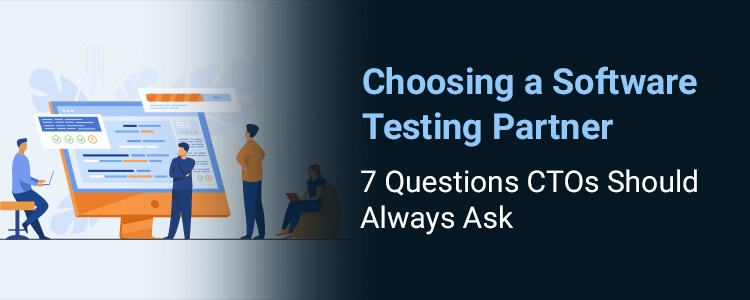
Choosing a Software Testing Partner - 7 Questions CTOs Should Always Ask
Software failures can cost companies millions, making the choice of a testing partner far more than a procurement task - it’s a strategic business decision. For CTOs, this isn’t about checking boxes. It’s about aligning business-critical systems with partners who can ensure flawless performance, airtight security, and impeccable user experiences.
When choosing a software testing company , it’s not just about technical expertise - it's about business understanding, risk foresight, scalability, and trust. A poor decision can result in postponed launches, exposed user information, and lasting harm to a brand's reputation. The right one? Faster time to market, smoother releases, and peace of mind.
So, how can you distinguish genuine performers from those who only appear to be? Here are 7 essential questions every CTO should ask before onboarding a software testing partner.
-
1. Do They Understand Our Domain and Industry?
Generic testing skills are not enough. Every industry - be it healthcare, fintech, e-commerce, or logistics - comes with its own compliance standards, user behaviors, and edge cases. A good partner doesn’t just test code. They bring domain-specific insights that anticipate real-world scenarios.
Ask for examples of similar clients or products they’ve tested. Look for familiarity with regulatory requirements if you operate in sensitive industries. The deeper their domain knowledge, the fewer surprises you’ll face during testing and release.
-
2. What’s Their Approach to Test Automation vs. Manual Testing?
Automation is critical for speed, scalability, and repeatability - but it's not a silver bullet. Manual testing still plays a key role in exploratory testing, UI/UX validation, and edge-case handling. A strategic testing partner will recommend the right mix based on your product maturity, timelines, and budget.
A good follow-up question here: Which frameworks, tools, and scripting languages do they use? Their tech stack should complement yours - not complicate it.
-
3. How Scalable and Flexible Is Their Team?
One of the key advantages of choosing a software testing service in USA is gaining access to a ready-made, scalable team that can adjust to your product’s lifecycle. Whether it’s ramping up for a major release or scaling down post-deployment, flexibility is key.
Ask how quickly they can onboard new testers. Can they provide specialized roles like security testers, performance engineers, or test architects on demand? If they’re rigid or overbooked, that’s a red flag.
-
4. Can They Integrate Seamlessly with Our Development Process?
Testing in silos is outdated. Today’s development is agile, continuous, and collaborative. Your testing partner must blend into your workflow - whether you’re using Scrum, DevOps, CI/CD pipelines, or custom agile frameworks.
Get clarity on:
- How they manage daily standups and sprint planning
- Which collaboration tools they use (e.g., JIRA, Slack, Azure DevOps)
- Their comfort with version control and integration with CI tools
Seamless integration leads to quicker feedback cycles and minimizes obstacles to release.
-
5. How Do They Handle Reporting and Communication?
One of the most overlooked aspects when choosing a software testing company is how they communicate progress and issues. Vague bug reports or irregular status updates can lead to project delays and missed deadlines.
Ask for sample dashboards or weekly report templates. Do they provide detailed bug reports with severity levels, screenshots, and steps to reproduce? Do they highlight risk areas and potential impact? Transparent and proactive reporting is often what separates a decent vendor from a great partner.
-
6. How Do They Handle Data Security and Confidentiality?
Security is a non-negotiable, especially if your product handles sensitive user data, financial transactions, or proprietary algorithms. A mature testing partner should have clear protocols around data access, anonymization, and compliance with standards like GDPR, HIPAA, or ISO 27001.
Key points to check:
- Do they use secure environments for test execution?
- Is data encrypted at rest and in transit?
- Do they sign NDAs and conduct regular internal audits?
Your software’s security depends on its weakest point - make sure your testing partner isn’t it.
-
7. What Do Their Clients Say About Them?
Don’t just take their pitch at face value — dig deeper. Ask for client references, case studies, or third-party reviews. Look beyond logos. Request actual performance metrics: How much did they reduce the defect leakage? What was the impact on time-to-market? Were deadlines consistently met?
Trust is built on results. And when choosing a software testing service in USA , you want a team with a proven track record of delivering value - not just code validation.
Conclusion: Think Long-Term, Not Just Tactical
Choosing a testing partner isn’t just a tactical decision to fix bugs — it’s a strategic alliance that impacts product quality, release velocity, customer satisfaction, and even brand credibility. A solid partner doesn’t just test features; they stress-test assumptions, mitigate risk, and become an extension of your engineering team.
As a CTO, these seven questions aren't just checkpoints. They're conversation starters that reveal how aligned your testing partner is with your long-term goals. Take the time to ask the right questions — and even more importantly, evaluate their responses with complete honesty.
Looking to simplify your decision-making process when it comes to software testing? With domain-specific expertise, scalable QA teams, and a commitment to precision and performance, Test Aces ensures your product stands up to the real world before it reaches your users.
FAQs
QA automation testing services help streamline repetitive tasks, improve test accuracy, and accelerate release cycles. A partner with strong automation capabilities ensures faster delivery, fewer errors, and significant cost savings.